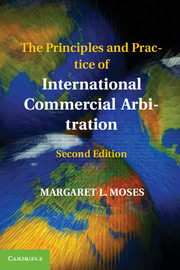Book contents
- Frontmatter
- Contents
- Preface to the Second Edition
- Foreword to the First Edition
- Chapter One Introduction to International Commercial Arbitration
- Chapter Two The Arbitration Agreement
- Chapter Three Drafting the Arbitration Agreement
- Chapter Four Applicable Laws and Rules
- Chapter Five Judicial Assistance for Arbitration
- Chapter Six The Tribunal
- Chapter Seven The Arbitral Proceedings
- Chapter Eight The Award
- Chapter Nine Attempts to Set Aside an Award
- Chapter Ten Enforcement of the Award
- Chapter Eleven Investment Arbitration
- Appendix A The United Nations Convention on the Recognition and Enforcement of Foreign Arbitral Awards (The New York Convention) (1958)
- Appendix B UNCITRAL Model Law on International Commercial Arbitration (original 1985 version)
- Appendix C Revised Articles of the UNCITRAL Model Law on International Commercial Arbitration (2006)
- Appendix D UNCITRAL Recommendation Regarding the Interpretation of Article II, Paragraph 2, and Article VII, Paragraph 1, of the New York Convention
- Appendix E IBA Rules on the Taking of Evidence in International Arbitration
- Appendix F IBA Rules of Ethics for International Arbitrators 1987
- Appendix G IBA Guidelines on Conflicts of Interest in International Arbitration
- Appendix H The AAA–ABA Code of Ethics for Arbitrators in Commercial Disputes
- Appendix I Model Clauses
- Appendix J Useful Arbitration Websites
- Index
- References
Chapter Five - Judicial Assistance for Arbitration
Published online by Cambridge University Press: 05 June 2012
- Frontmatter
- Contents
- Preface to the Second Edition
- Foreword to the First Edition
- Chapter One Introduction to International Commercial Arbitration
- Chapter Two The Arbitration Agreement
- Chapter Three Drafting the Arbitration Agreement
- Chapter Four Applicable Laws and Rules
- Chapter Five Judicial Assistance for Arbitration
- Chapter Six The Tribunal
- Chapter Seven The Arbitral Proceedings
- Chapter Eight The Award
- Chapter Nine Attempts to Set Aside an Award
- Chapter Ten Enforcement of the Award
- Chapter Eleven Investment Arbitration
- Appendix A The United Nations Convention on the Recognition and Enforcement of Foreign Arbitral Awards (The New York Convention) (1958)
- Appendix B UNCITRAL Model Law on International Commercial Arbitration (original 1985 version)
- Appendix C Revised Articles of the UNCITRAL Model Law on International Commercial Arbitration (2006)
- Appendix D UNCITRAL Recommendation Regarding the Interpretation of Article II, Paragraph 2, and Article VII, Paragraph 1, of the New York Convention
- Appendix E IBA Rules on the Taking of Evidence in International Arbitration
- Appendix F IBA Rules of Ethics for International Arbitrators 1987
- Appendix G IBA Guidelines on Conflicts of Interest in International Arbitration
- Appendix H The AAA–ABA Code of Ethics for Arbitrators in Commercial Disputes
- Appendix I Model Clauses
- Appendix J Useful Arbitration Websites
- Index
- References
Summary
In international commercial arbitration, most of the time parties and arbitrators do not want interference from a court. There are, however, times when the support of a court can prove essential. The primary reason is that courts have resources that are lacking to a tribunal – in particular, coercive powers – that is, the ability to make someone do something. Courts can require performance because they have the ability to impose negative consequences if a person does not perform – in the form of fines, incarceration, or other penalties. Although tribunals have some ability to impose negative consequences on parties, such as drawing an adverse inference if a party does not produce documents, they have no ability to make a party carry out an order, and no coercive powers that can be applied to persons who are not party to the arbitration.
Courts also have an oversight role. Although arbitration is a private system of justice, organized and regulated by the parties in light of the rules and procedures they have chosen, it is still governed by law, and almost always by the arbitration law (lex arbitri) of the seat of the arbitration. Courts expect to retain a level of control to ensure that the private system of justice meets at least minimum standards of fairness – so that arbitration is not a system that is fraudulent, corrupt, or lacking in essential due process.
- Type
- Chapter
- Information
- Publisher: Cambridge University PressPrint publication year: 2012



